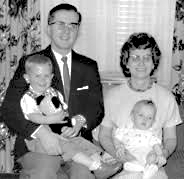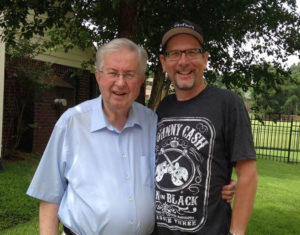I was born and raised in the town of Three Hills, Alberta – and words were important in the Rendall house when I was growing up. VERY important. With a father who for ninety percent of his daylight hours was either writing, speaking or reading words, you could say that I didn’t stand a chance! Both Dad and Mom were authors, with Dad having written at least ten books and Mom five.

The Rendall Family in 1963. Left: T.S. (Ted) Rendall with the author (Stephen Rendall) on his knee. Right: Norline Rendall, holding the author’s brother, David Rendall.
Dad was a faculty member of Prairie College (founded as Prairie Bible Institute), and through the years also became its Principal, Vice-President, and finally President. He also pastored a small country church called Bethel Fellowship Church for twenty years, and then was Senior Pastor at the Prairie Tabernacle Congregation for another twenty years. For over thirty years, Dad was the editor and principle author of Prairie College’s flagship publication, The Prairie Overcomer (in addition to the children’s magazine Young Pilot). He wrote thousands of articles for this magazine over the years. He would also edit and contribute to the books of other well-known authors when he could find the time. Mom, a best-selling author in her own right, could type 120 words a minute on a manual typewriter in her prime and also take shorthand. She served as home secretary to Dad, and prepared many of his manuscripts to go to the publisher. The proofs, or “galleys” as they were called, would come back and be checked over. Edits and corrections were made, and off to the press they would go. It was always a great time of celebration when a copy of the finished book would arrive in the mail.
With close to one hundred thousand books in his collection, in addition to thousands of magazine clippings and other documents, it was clear that words dominated every inch of our house. Dad has been collecting books since he was twelve years old and still shows no sign of slowing down! Old books, new books, large books, small books – Dad loves them all. He could pretty much put his hand on anything you might be looking for to finish a report or research project for school.
I was fully immersed in this culture of words from my earliest memories. Mom and Dad would listen to the BBC radio show “My Word!”, broadcast on CBC, and would try to outsmart and out-guess the contestants. Long discussions at mealtimes over syntax, context, grammar and punctuation dominated the conversation. Dictionaries and other writing tools were always at the ready to settle any dispute. Mom and Dad loved Scrabble, and the game definitely brought out their competitive spirits. Puns and clever nuances were the order of the day. Dad would sit in his recliner almost every evening grading papers, preparing sermons or reading a book. He was a good multi-tasker. He could listen to the CBC Concert Hall program and have a conversation with Mom, or occasionally us boys, all while reading his book!
Dad kept a stash of red pencils on a tray beside his chair. I think he bought these at the Prairie College Bookroom in boxes of twelve. He would go through all the pencils and if any were dull, he would get up and sharpen the whole lot at once. He claimed this was a much more efficient way of using his time and he was probably right. With these pencils, he would underline important thoughts and points in his books. Corrections were made to any punctuation or spelling mistakes he found. This he did by underlining the offending spot and then writing a note in the margin of the book. Occasionally, he would also add small reference notes that brought more light or clarification to the subject at hand.

Stephen Rendall, during his high school years – in his recording studio in the basement of his family home.
The high school I attended was called Prairie High School (now known as Prairie Christian Academy). Bible 10 class was held at 11:30 a.m., Monday to Friday, in the basement math room of the High School building. Our teacher was also the Dean of High School girls, as well as having several other responsibilities. Many times she would be late for class, not really prepared, and in general seemed unsure as to the direction of the class. She was frustrated as she tried to impart some sort of spiritual formation to a bunch of restless high school kids. One day I had had enough. I started to think about various ways that I could show my frustration to this teacher. First, I thought about a petition. I talked to my classmates and found that many shared my frustration, but no one would sign the petition. I then encouraged everyone to write letters, but no one did. I stopped short of picketing. However, in my own haste and foolishness, I composed a letter to the teacher and unleashed as much venom and anger as my little Grade 10 brain could muster.
“That should do something,” I said to myself as I popped the letter in the mail. To say “something happened” would be an understatement!
I was summoned to Principal Ken Penner’s office. Waving the offending document in my face, he asked me, “Rendall, did you write this letter?”
“Yes, I did,” I replied.
Ken continued, “I’ve called your father, and he is on his way over here from his office.”
“Oh, boy,” I thought. “This could get interesting.”
To add to my stupidity, and wanting to show an inclusive spirit, I had taken the liberty of citing the names of various other students who had said they felt like I did. Evidently that was a big no-no. I have known Ken Penner my whole life, and I could tell that he was not the least bit impressed. Quite the opposite – he was ticked. This was not the desired result.
After a lengthy summit meeting with my father and Ken, it was decided that I would have to meet with the teacher, apologize for my letter and my behavior, and promise to behave myself for the remainder of the school year. There may have been some manual labour in the boiler plant assigned as well. I was a frequent visitor to the boiler plant in my high school years, but I am not always clear in my current old age which specific offenses landed me there. I think I painted the same wall multiple times and became fairly adept at busting up large chunks of concrete with a sledgehammer. On this occasion, I was informed by Ken in no uncertain terms that if I caused any more trouble, things could and would get a whole lot worse.
Looking back, I realize that I never understood at the time the tremendous pressure and burden of responsibility this teacher was under. She had way too much on her plate, and I am sure that teaching our class at the end of the morning was the last thing she wanted to do. Having to deal with knotheads like me just made things worse. As an adult who has had to deal with more than a little pressure, often with too much on my plate, I have a much better appreciation now for what she must have been going through at the time. In the heat of the moment, selfishly, all I could think about were my own needs and the needs of the class. I never gave any consideration to my teacher’s needs, or to her situation. The words I used in my letter were mean, hurtful and spirit-crushing. There was no excuse.
Dad took me aside after the meeting and told me two things that I have never forgotten. First, he said, “Son, never document in writing something that you do not want to be used against you.” (Or, as Jane Fonda has so aptly written, “Best not to leave everlasting proof of your temporary insanity.”)
Dad’s other piece of advice was, “If you write a letter out of anger or frustration, put it in a drawer for at least a day or two. When you go back to it, see if you still feel the same way, or if your letter could be rewritten.”
I have tried to live out those two pieces of advice in my life. I haven’t always succeeded, but I am sure Dad’s wisdom has helped me on more than one occasion.
We have all heard the saying, “Sticks and stones may break my bones, but words can never hurt me.” Don’t believe it! Words are powerful. Words can inflict pain, and cause heartache and discouragement. In our interaction with our partners, children, friends, and business associates, let’s all choose to use words that will encourage, heal, and bring hope.
And by the way, if you need a red pencil to make a few corrections, I think Dad may have an extra one or maybe a dozen kicking around.
All photos courtesy of Stephen Rendall.









I knew Ted Randall in Bible School. Also, the Norbo girls, Pauline and Noreen rode from Northern Idaho to Prairie in a truck from our farm.
The “put it in a drawer and rest overnight” is advice I have found useful, too. I have a question that the story doesn’t answer: Assuming that that teacher’s record was accurately described, did the administration take responsibility for not doing the necessary work with the teacher to improve teaching techniques?